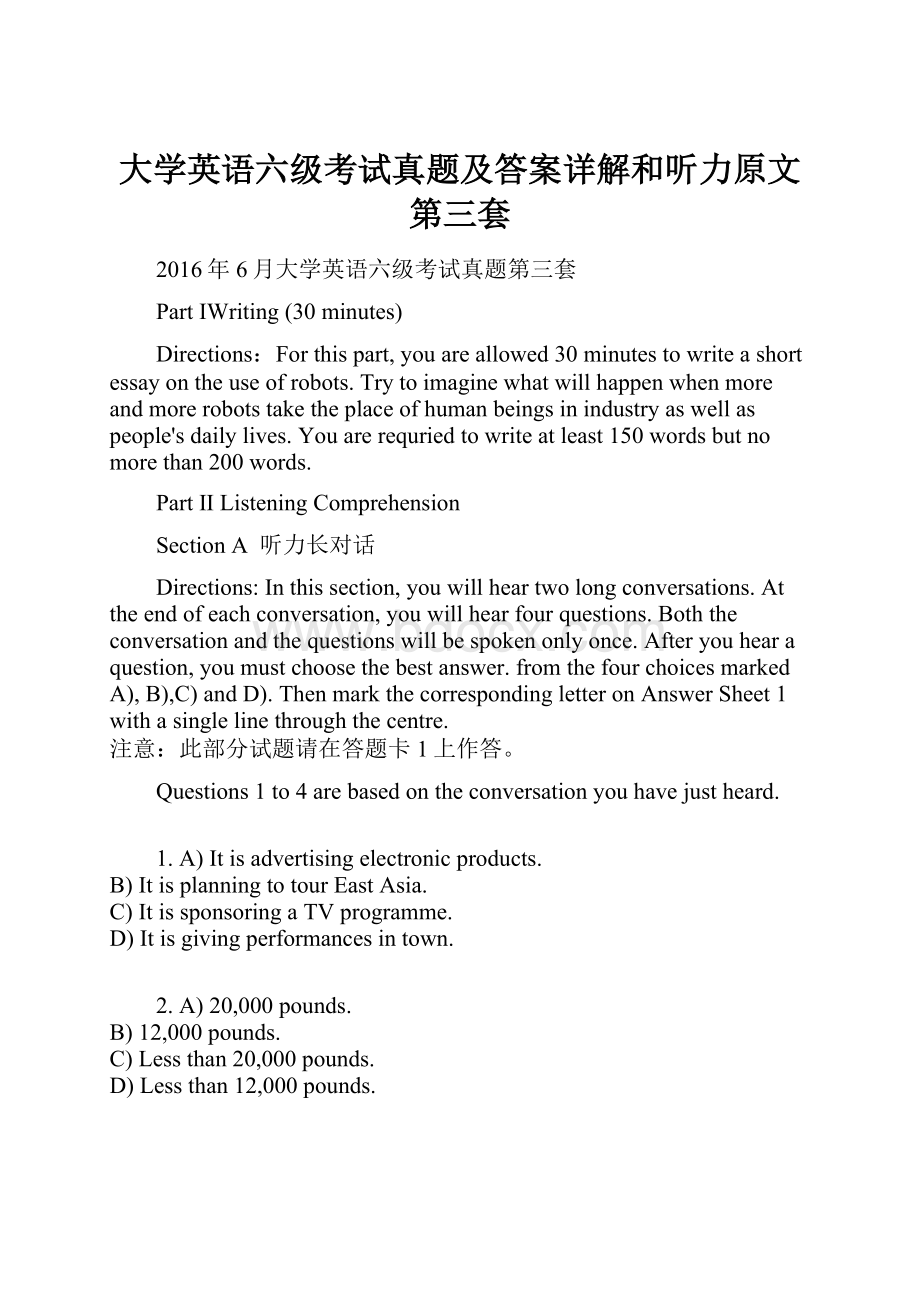大学英语六级考试真题及答案详解和听力原文第三套.docx
《大学英语六级考试真题及答案详解和听力原文第三套.docx》由会员分享,可在线阅读,更多相关《大学英语六级考试真题及答案详解和听力原文第三套.docx(47页珍藏版)》请在冰豆网上搜索。

大学英语六级考试真题及答案详解和听力原文第三套
2016年6月大学英语六级考试真题第三套
PartⅠWriting(30minutes)
Directions:
Forthispart,youareallowed30minutestowriteashortessayontheuseofrobots.Trytoimaginewhatwillhappenwhenmoreandmorerobotstaketheplaceofhumanbeingsinindustryaswellaspeople'sdailylives.Youarerequriedtowriteatleast150wordsbutnomorethan200words.
PartⅡListeningComprehension
SectionA 听力长对话
Directions:
Inthissection,youwillheartwolongconversations.Attheendofeachconversation,youwillhearfourquestions.Boththeconversationandthequestionswillbespokenonlyonce.Afteryouhearaquestion,youmustchoosethebestanswer.fromthefourchoicesmarkedA),B),C)andD).ThenmarkthecorrespondingletteronAnswerSheet1withasinglelinethroughthecentre.
注意:
此部分试题请在答题卡1上作答。
Questions1to4arebasedontheconversationyouhavejustheard.
1.A)Itisadvertisingelectronicproducts.
B)ItisplanningtotourEastAsia.
C)ItissponsoringaTVprogramme.
D)Itisgivingperformancesintown.
2.A)20,000pounds.
B)12,000pounds.
C)Lessthan20,000pounds.
D)Lessthan12,000pounds.
3.A)Alotofgoodpublicity.
B)Talentedartiststoworkforit.
C)Long-terminvestments.
D)Adecreaseinproductioncosts.
4.A)Promiselong-termcooperationwiththeCompany.
B)Explainfranklytheirowncurrentfinancialsituation.
C)Payfortheprintingoftheperformanceprogramme.
D)BearthecostofpublicisingtheCompany'sperformance.
Questions5to8arebasedontheconversationyouhavejustheard.
5.A)Hehasbeenseeingdoctorsandcounsellors.
B)Hehasfoundanewwaytotrainhisvoice.
C)Hewascaughtabusingdrugs.
D)Hemightgiveupconcerttours.
6.A)Singersmay becomeaddictedtoit.
B)Ithelpssingerswarmthemselvesup.
C)Singersuseittostayawayfromcolds.
D)Itcandoharmtosingers'vocalchords.
7.A)Theyareeagertobecomefamous.
B)Manylackprofessionaltraining.
C)Fewwillbecomesuccessful.
D)Theyliveaglamorouslife.
8.A)Harmtosingersdonebysmokyatmospheres.
B)Sideeffectsofsomecommondrugs.
C)Voiceproblemsamongpopsingers.
D)Hardshipsexperiencedbymanyyoungsingers.
SectionB 听力短文
Directions:
Inthissection,youwillheartwopassages.Attheendofeachpassage,youwillhearthreeorfourquestions.Boththepassageandthequestionswillbespokenonlyonce.Afteryouhearaquestion,youmustchoosethebestanswerfromthefourchoicesmarkedA),B),C)andD).ThenmarkthecorrespondingletteronAnswerSheet1withasinglelinethroughthecentre.
PassageOne
Questions9to12arebasedonthepassageyouhavejustheard.
9.A)Ithasnotbeenverysuccessful.
B)Ithaslong becomeanewtrend.
C)Ithasmetwithstrongresistance.
D)Ithasattractedalotofusers.
10.A)Itsavestime.
B)Itincreasesparkingcapacity.
C)Itensuresdrivers'safety.
D)Itreducescardamage.
11.A)Collectmoneyandhelpnewusers.
B)Maintaintheautomatedsystem.
C)Stayalerttoanyemergency.
D)Walkaroundandguardagainstcartheft.
12.A)Theywillvarywiththesizeofvehicles.
B)Theywillbediscountabletoregularcustomers.
C)Theywillbelowerthanconventionalparking.
D)Theywillbereducedifpaidincash.
PassageTwo
Questions13to15arebasedonthepassageyouhavejustheard.
13.A)Theydonotknowanysolution.
B)Theydonotgiveupdrunkdriving.
C)Theydonotbehaveinpublicplaces.
D)Theydonotadmitbeingalcoholaddicts.
14.A)Tostopthemfromfightingback.
B)Tothankthemfortheirhospitality.
C)ToteachthemtheEuropeanlifestyle.
D)Torelievetheirpainsandsufferings.
15.A)Withoutinterventiontheywillbeaheadachetothenation.
B)Withsupporttheycanbebroughtbacktoanormallife.
C)Theyreadilyrespondtomedicaltreatment.
D)Theyposeaseriousthreattosocialstability.
SectionC 听力录音
Directions:
Inthissection,youwillhearthreerecordingsoflecturesortalksfollowedbythreeorfourquestions.Therecordingswillbeplayedonlyonce.Afteryouhearaquestion,youmustchoosethebestanswerfromthefourchoicesmarkedA),B),C)andD).ThenmarkthecorrespondingletteronAnswerSheet1withasinglelinethroughthecentre.
RecordingOne
Questions16to19arebasedontherecordingyouhavejustheard.
16.A)Toawardthemfortheirhardwork.
B)Tobuildcommonviews.
C)Tobringinbusinessprojects.
D)Tovoteforaction.
17.A)Recoveringfromthe GreatRecession.
B)Creatingjobsandboostingtheeconomy.
C)Rewardinginnovativebusinesses.
D)Launchingeconomiccampaigns.
18.A)Talkingoverpayingoffdeficit.
B)Increasingthenumberofmiddleclass.
C)Controllingtheimpactoneducation.
D)Planningtoreduceenergyconsumption.
19.A)ShortenAmerica'swaytoprosperity.
B)Becautiousaboutreducingthedeficit.
C)Increasedeficittocovertherevenue.
D)Requiretherichesttopaymoretaxes.
RecordingTwo
Questions20to22arebasedontherecordingyouhavejustheard.
20.A)Theycanberedeemedforcash.
B)Theycanbeusedtoreducemealcosts.
C)Theycanbeusedasmembershipcertificate.
D)Theycanbeusedtomakereservations.
21.A)Itisfreeforustodownloadtheapp.
B)Ithelpsyoutobeaprofessionalcook.
C)Itprovidesadviceaboutmakingrecipes.
D)Itonlyratesrecipesbypopularity.
22.A)Byshowingtheweightof200kindsoffood.
B)Byprovidingthepriceof200caloriesoffood.
C)Bypicturingthefoodof200calorieswithweights.
D)Bytellingpeople200kindsofhealthyfood.
RecordingThree
Questions23to25arebasedontherecordingyouhavejustheard.
23.A)About43percentofAmericanadults.
B)About18percentofthewholepopulation.
C)About40millionAmericanadults.
D)AboutahalfmillionpeopleinAmerica.
24.A)Tosetaseriesofbansonpublicsmoking.
B)Tosetthepriceofcigarettesproperly.
C)Topackagethecigaretteswithtipsofwarning.
D)Toreducetheproductionandsupplyofcigarettes.
25.A)TheofficeoftheSurgeonGeneral.
B)TheFoodandDrugAdministration.
C)TheCenterforTobaccoProducts.
D)TheCenterforDiseaseControlandPrevention.
PartⅢTranslation
Questions 26 to 35 are based on the following passage.
The robotics revolution is set to bring humans face to face with an old fear—man-madecreations as smart and capable as we are but without a moral compass. As robots take onever more complex roles, the question naturally 26_________:
Who will be responsible whenthey do something wrong?
Manufacturers?
Users?
Software writers?
The answer depends on therobot.Robots already save us time, money and energy. In the future, they will improve our healthcare, social welfare and standard of living. The 27__________ of computational power andengineering advances will 28__________ enable lower-cost in-home care for the disabled,29__________ use of driverless cars that may reduce drunk- anddistracted-driving
accidentsand countless home and service-industry uses for robots, from street cleaning to foodpreparation.But there are
30________ to be problems. Robotcars will crash. A drone (遥控飞行器)operator will 31________ someone'sprivacy.
A robotic lawn mower will run over aneighbor’s cat.Juries sympatheticto the 32__________ofmachines will punish
entrepreneurs withcompany-crushing 33__________ and damages.What shouldgovernmentsdo toprotect people
while 34__________ space for innovation?
Big, complicated systems on which much public safety depends, like driverless cars, should bebuilt,35__________ and sold by manufacturers who take responsibilityfor ensuring safety andare liable
for accidents. Governments should set safety requirements and then let insurersprice the risk of the robots based on the manufacturer's driving record, not the passenger's.
A. arises
B. ascends
C. bound
D. combination
E. definite
F. eventually
G. interfere
H. invade
I. manifesting
J. penalties
K. preserving
L. programmed
M. proximately
N. victims
O. widespread
Section B
Directions:
In this section, you are going to read a passage with ten statements attached to it. Each statement contains information given in one of the paragraphs. Identify the paragraphfrom which the information is derived. You may choose a paragraph more than once. Eachparagraph is marked with a letter. Answer the questions by marking the corresponding letter onAnswer Sheet 2.
Reform and Medical Costs
[A] Americans are deeply concerned about the relentless rise in health care costs and healthinsurance premiums. They need to know if reform will help solve the problem. The answer isthat no one has an easy fix for rising medical costs. The fundamental fix—reshaping how careis delivered and how doctors are paid in a wasteful, abnormal system—is likely to be achievedonly through trial and error and incremental (渐进的)gains.
[B] The good news is that a bill just approved by the House and a bill approved by the SenateFinance Committee would implement or test many reforms that should help slow the rise inmedical costs over the long term. As a report in The New England Journal of Medicineconcluded,"Pretty much every proposed innovation found in the health policy literature thesedays is contained in these measures."
[C] Medical spending, which typically rises faster than wages and the overall economy, ispropelled by two things:
the high prices charged for medical services in this country and thevolume of unnecessary care delivered by doctors and hospitals, which often perform a lotmore tests and treatments than a patient really needs.
[D] Here are some of the important proposals in the House and Senate bills to try to addressthose problems, and why it is hard to know how well the